2023年外研版中考英语复习 第一节 同义词、近义词的归纳总结和辨析(动词类辨析 )课件(共44张PPT)
文档属性
| 名称 | 2023年外研版中考英语复习 第一节 同义词、近义词的归纳总结和辨析(动词类辨析 )课件(共44张PPT) |  | |
| 格式 | pptx | ||
| 文件大小 | 500.7KB | ||
| 资源类型 | 教案 | ||
| 版本资源 | 外研版 | ||
| 科目 | 英语 | ||
| 更新时间 | 2023-06-01 06:32:43 | ||
图片预览

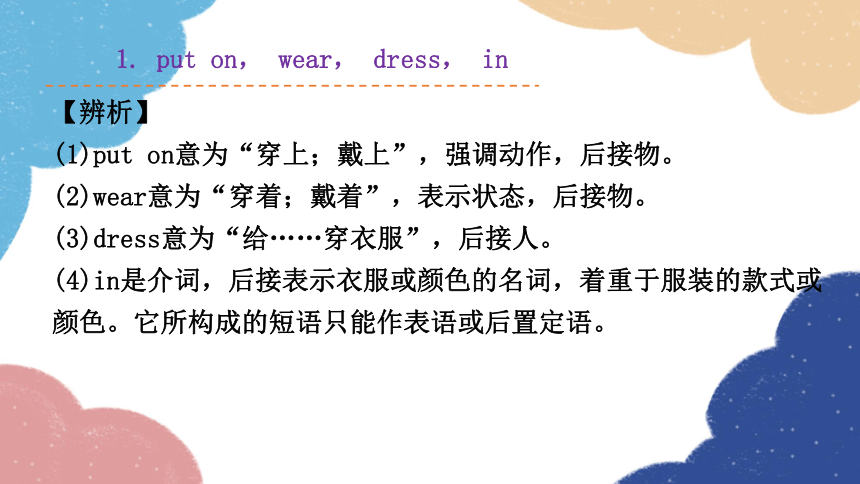
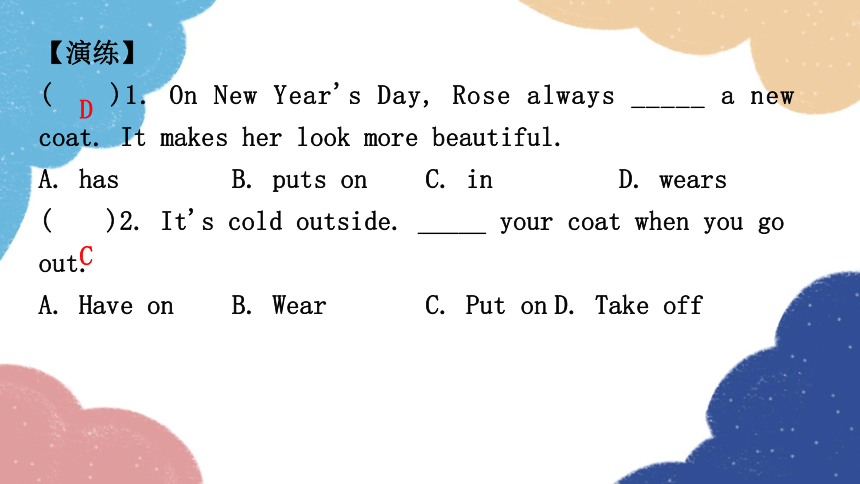
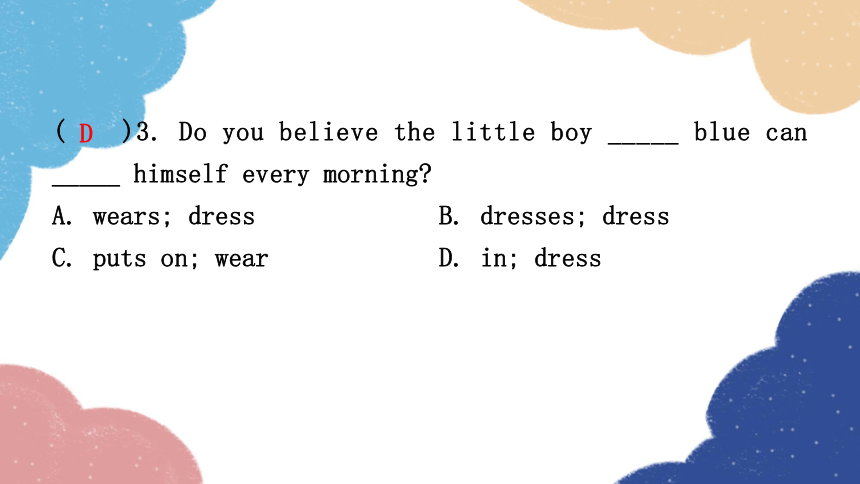
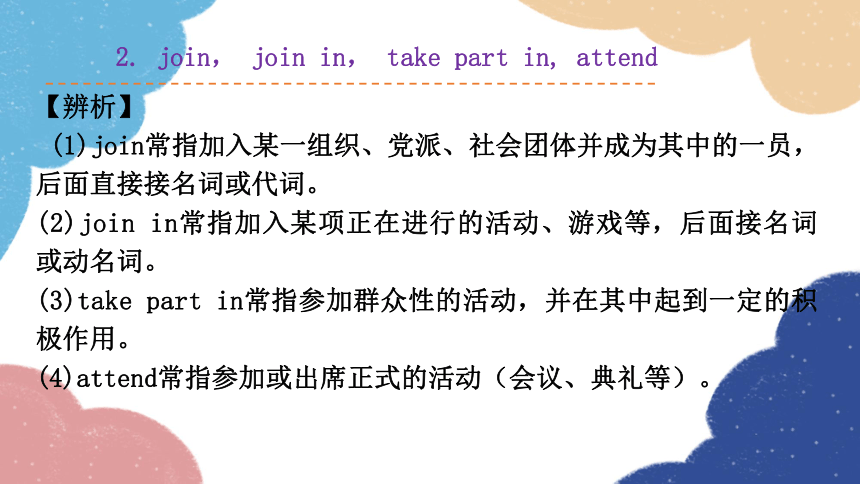

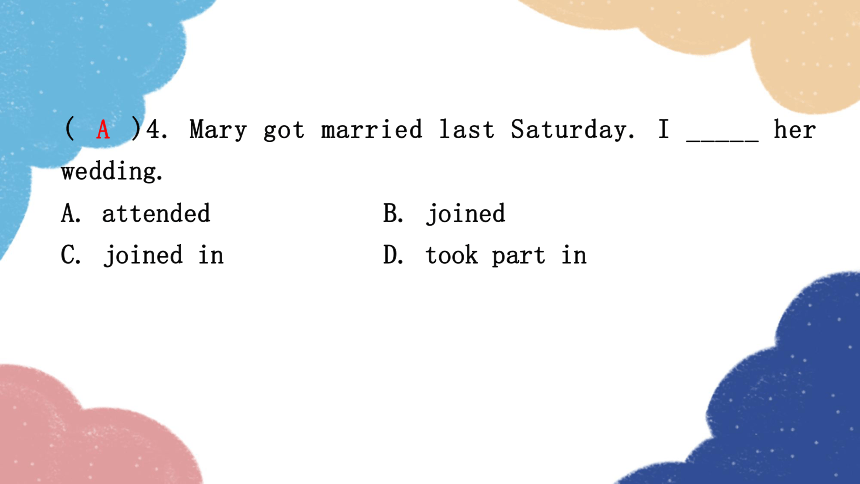
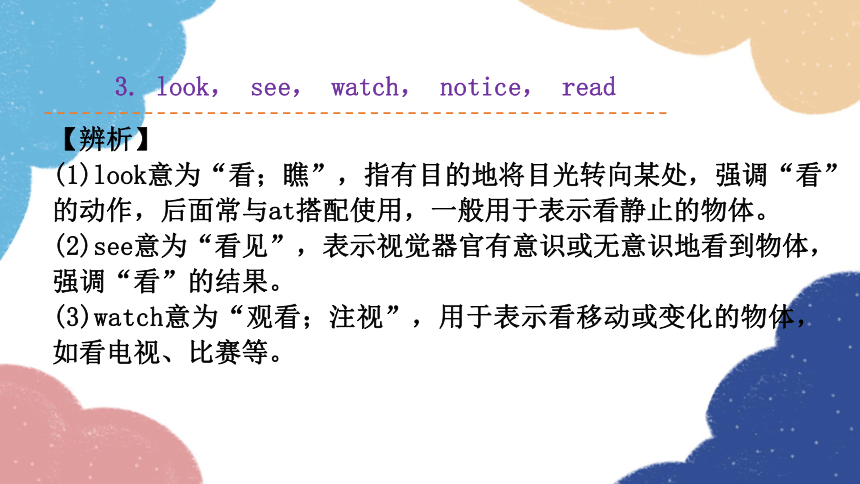
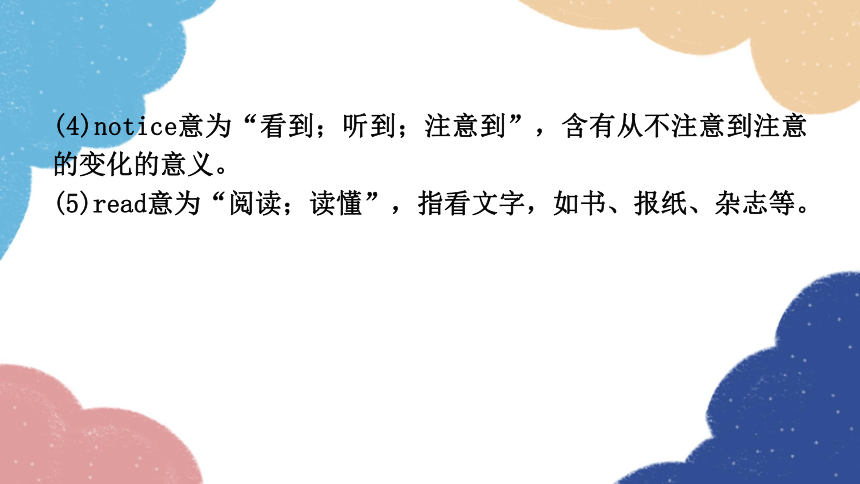
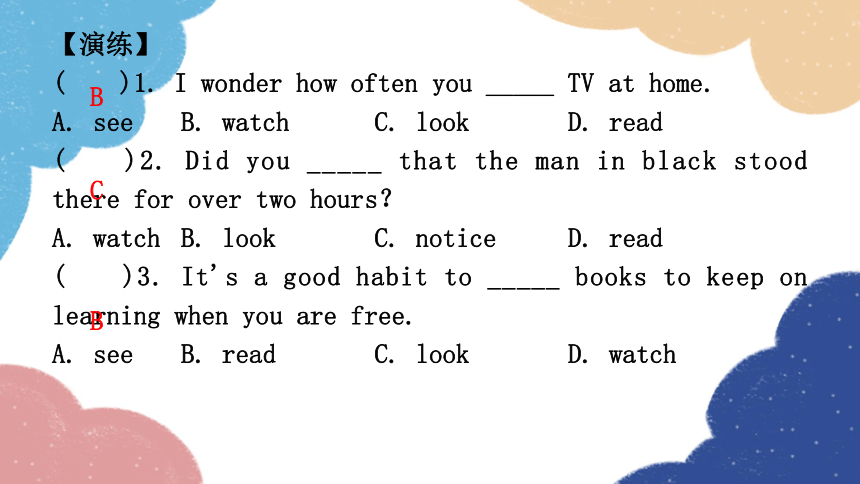
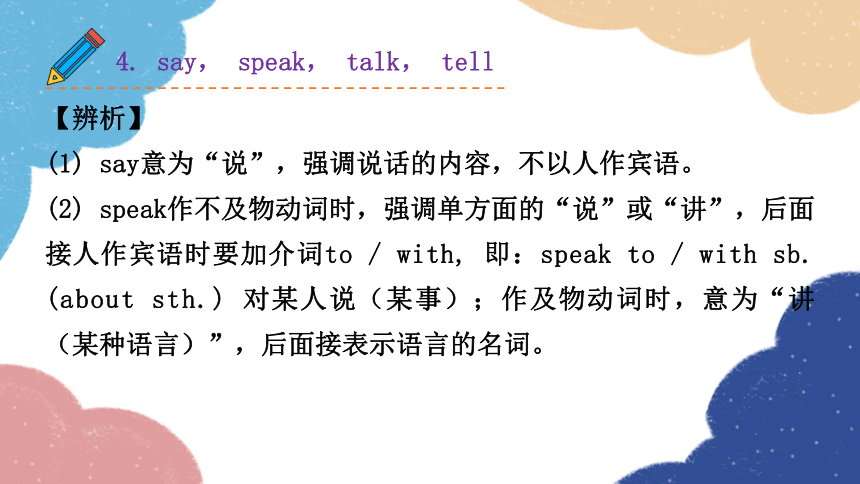
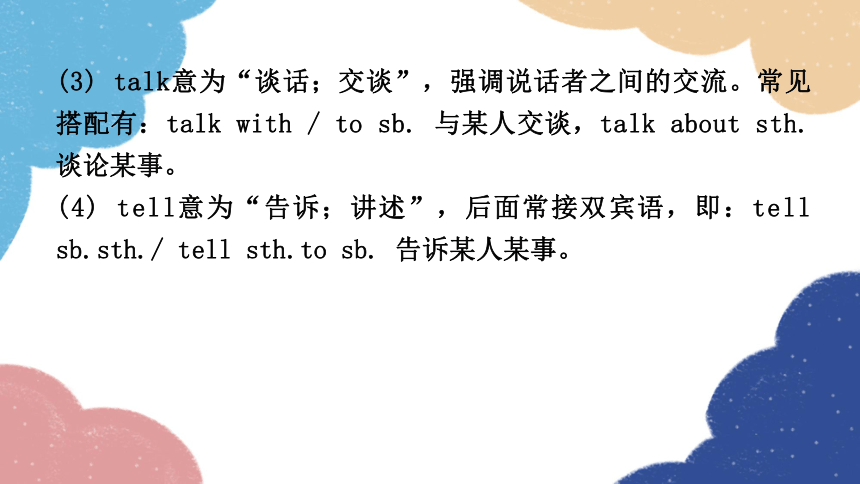
文档简介
(共44张PPT)
中考高频词汇突破
第一节 同义词、近义词的归纳总结和辨析
动词类辨析
【辨析】
(1)put on意为“穿上;戴上”,强调动作,后接物。
(2)wear意为“穿着;戴着”,表示状态,后接物。
(3)dress意为“给……穿衣服”,后接人。
(4)in是介词,后接表示衣服或颜色的名词,着重于服装的款式或颜色。它所构成的短语只能作表语或后置定语。
1. put on, wear, dress, in
【演练】
( )1. On New Year's Day, Rose always _____ a new coat. It makes her look more beautiful.
A. has B. puts on C. in D. wears
( )2. It's cold outside. _____ your coat when you go out.
A. Have on B. Wear C. Put on D. Take off
D
C
( )3. Do you believe the little boy _____ blue can _____ himself every morning
A. wears; dress B. dresses; dress
C. puts on; wear D. in; dress
D
【辨析】
(1)join常指加入某一组织、党派、社会团体并成为其中的一员,后面直接接名词或代词。
(2)join in常指加入某项正在进行的活动、游戏等,后面接名词或动名词。
(3)take part in常指参加群众性的活动,并在其中起到一定的积极作用。
(4)attend常指参加或出席正式的活动(会议、典礼等)。
2. join, join in, take part in, attend
【演练】
( )1. The school sports meeting is coming. I would like to _____ it.
A. take part B. join C. take part in D. join in
( )2. She _____ the Health Club last year.
A. attended B. took part in C. joined in D. joined
( )3. I want to _____ the game you are playing. Is that OK
A. join B. take part in C. attend D. join in
C
D
D
( )4. Mary got married last Saturday. I _____ her wedding.
A. attended B. joined
C. joined in D. took part in
A
【辨析】
(1)look意为“看;瞧”,指有目的地将目光转向某处,强调“看”的动作,后面常与at搭配使用,一般用于表示看静止的物体。
(2)see意为“看见”,表示视觉器官有意识或无意识地看到物体,强调“看”的结果。
(3)watch意为“观看;注视”,用于表示看移动或变化的物体,如看电视、比赛等。
3. look, see, watch, notice, read
(4)notice意为“看到;听到;注意到”,含有从不注意到注意的变化的意义。
(5)read意为“阅读;读懂”,指看文字,如书、报纸、杂志等。
【演练】
( )1. I wonder how often you _____ TV at home.
A. see B. watch C. look D. read
( )2. Did you _____ that the man in black stood there for over two hours?
A. watch B. look C. notice D. read
( )3. It's a good habit to _____ books to keep on learning when you are free.
A. see B. read C. look D. watch
B
C
B
【辨析】
(1) say意为“说”,强调说话的内容,不以人作宾语。
(2) speak作不及物动词时,强调单方面的“说”或“讲”,后面接人作宾语时要加介词to / with, 即:speak to / with sb. (about sth.) 对某人说(某事);作及物动词时,意为“讲(某种语言)”,后面接表示语言的名词。
4. say, speak, talk, tell
(3) talk意为“谈话;交谈”,强调说话者之间的交流。常见搭配有:talk with / to sb. 与某人交谈,talk about sth. 谈论某事。
(4) tell意为“告诉;讲述”,后面常接双宾语,即:tell sb.sth./ tell sth.to sb. 告诉某人某事。
【演练】
( )1. You should _____ goodbye to Mr.Wu before leaving the town tomorrow.
A. speak B. tell C. say D. talk
( )2. My uncle often _____ us funny stories when we were young.
A. said B. spoke C. told D. talked
C
C
( )3. This Friday afternoon, my teacher wants to _____ with my parents. I'm a little worried.
A. speak B. talk C. tell D. say
( )4. Ashley could _____ two languages—German and French.
A. speak B. talk C. say D. tell
B
A
【辨析】
四者都可以表示“花费”,但用法均有不同。
(1)spend的主语是人,通常表示花费时间或金钱,常见用法有:sb.spend(s) time / money on sth. 某人在……上花费时间 / 金钱,sb.spend(s) time / money (in)doing sth. 某人花费时间 / 金钱做某事。
5. spend,cost, take, pay
(2)cost的主语是某物或某事,通常表示花费金钱,常见用法有:sth.cost(s)sb.money某物花了某人多少钱。
(3)take的主语是it或某事,通常表示花时间,常见用法有:it takes sb.time to do sth. =doing sth.takes sb.time做某事花了某人多少时间。
(4)pay的主语是人,通常表示花费金钱,常与for搭配使用,常见搭配有:pay (sb.)money for sth.付钱(给某人)买某物,pay for sth.为某物付钱,pay for sb.替某人付钱。
【演练】
( )1. It _____ Mary about two days to finish this project.
A. paid B. took C. spent D. cost
( )2. He _____ much time on books. So he knows a lot about this subject.
A. pays B. takes C. costs D. spends
B
D
( )3. —How much is the ticket to Central Park?
—A one-way ticket _____ ¥40, and you can _____ another ¥20 for a round-trip ticket.
A. costs; pay B. costs; spend
C. pays; spend D. spends; pay
A
【辨析】
(1)take意为“拿走;带走”,指把某物或某人从说话处带到别处去。
(2)bring意为“拿来;带来”,指把某物或某人从别处带到说话处来。
6. take, bring, get, carry
(3)get意为“取来”,表示到某处把某人请来或把某物取来(双程)。
(4)carry意为“搬运;携带”,不具体说明来去的方向,有时含有沉重或麻烦之意。
【演练】
( )1. —Tom, don't forget to _____ your homework to school.
—OK, Mom.
A. take B. bring C. get D. carry
( )2. —Tom, have you _____ your homework
—Yes, Miss Zhang. Here you are.
A. taken B. got C. brought D. carried
A
C
( )3. Ben, can you help me _____ the box It is too heavy.
A. take B. carry C. bring D. get
( )4. There is no water in the bottle. Why not go and _____ some?
A. take B. get C. carry D. bring
B
B
【辨析】
(1)borrow强调“借入”,是非延续性动词。borrow ... from ... 向某人 /从某处借入某物。
(2)lend强调“借出”,是非延续性动词。lend sth.to sb./lend sb.sth. 借出某物给某人。
(3)keep意为“保留;借”,是延续性动词。“keep sth.for+时间段”表示“借某物多长时间”。
7. borrow, lend, keep
【演练】
( )1. —Can I _____ your bike My bike is broken.
—Sorry. I can't _____ it to you because mine is broken, too.
A. borrow; borrow B. lend; lend
C. borrow; lend D. lend; borrow
( )2. Daisy _____ a book from her cousin and she has _____ it for three weeks.
A. borrowed; lent B. borrowed; kept
C. lent; kept D. kept; borrowed
C
B
【辨析】
(1)get表示“到达”时是不及物动词,要与介词to连用,即:get to+表示地点的名词。
(2)arrive是不及物动词,表示“到达”时要借助介词in或at,后接大地点用in,后接小地点用at,即:arrive in+大地点,arrive at+小地点。
8. get, arrive, reach
(3)reach表示“到达”时是及物动词,直接接地点,即:reach+表示地点的名词。
注意 (1)当arrive和get后面接表示地点的副词(如here, there, home等)时,无须加介词。(2)如果需要单独使用,后面不接任何地点名词或副词时,只能用arrive。
【演练】
( )1. Last night, Alice _____ New York and began her trip there.
A. got B. arrived at C. reached in D. arrived in
( )2. I wanted to know when you _____ the school library yesterday afternoon.
A. arrived B. got C. reached D. arrived in
D
C
( )3. What were you doing when your teacher _____ the classroom?
A. got to B. got
C. arrived D. arrived in
A
【辨析】
(1)leave意为“忘了带;丢下”,常用于“leave sth./sb.+某处”结构中,表示“将某物 / 某人落在某处”。
(2)forget意为“忘记带(需要之物)”,后面直接接名词,不再接地点。
(3)lose意为“丢失;失去”,表示找不到某物或某人。
9. leave, forget, lose
【演练】
( )1. I have _____ my schoolbag at home. I can't hand in my homework now.
A. lost B. forgotten C. left D. missed
( )2. On his way home, Jack _____ his wallet and he had to go back to look for it.
A. lost B. left C. sold D. forgot
( )3. Once when we were going to Paris, I _____ my passport.
A. left B. forgot C. left to D. forgot to
C
A
B
【辨析】
(1)look for意为“寻找”,强调找的过程,结果未知。
(2)find意为“找到”,强调找的结果。
(3)find out意为“查出;查明”,表示经过调查后弄清真相。
10. look for, find, find out
【演练】
( )1. The police _____ the missing child in the mountain, but they couldn't _____ him.
A. found; look for B. found out; find
C. looked for; find D. looked for; find out
( )2. The man died accidentally yesterday. The police were trying to _____ the truth.
A. come out B. sell out C. find out D. set out
C
C
【辨析】
(1)offer意为“给予”,强调主动提供,常见搭配有:offer sb.sth./offer sth.to sb.提供某人某物。
(2)provide意为“供给;提供”,强调提供生活必需品或他人想要的物品,常见搭配有:provide sb.with sth. / provide sth.for sb.为某人提供某物。
(3)supply意为“供应;提供”,强调长期并且量大的供应,常见搭配有:supply sb.with sth. / supply sth.to sb.向某人提供某物。
11. offer, provide, supply
【演练】
( )1. The government _____ enough food and drink for the people in the earthquake.
A. supplied B. offered C. provided D. gave
( )2. She _____ me 2 dollars so that I could have enough money to buy some books to read.
A. provided B. offered C. borrowed D. supplied
( )3. Our school _____the students with warm water in the dormitory every day.
A. supplies B. offers C. sells D. buys
C
B
A
【辨析】
(1)accept意为“接受”,指主观上接受或同意,强调本人的意愿。
(2)receive意为“接到”,指客观上收到某物,与本人意愿无关。
12. accept, receive
【演练】
( )1. He asked me to marry him and I _____.
A. got B. accepted C. received D. took
( )2. She _____ a bunch of roses, but she didn't know who sent them to her.
A. accepted B. received C. brought D. left
B
B
【辨析】
(1)happen意为“发生;碰巧”,泛指客观事物或情况的发生,强调动作的偶然性,常见搭配有:happen to sb.发生在某人身上, happen to do sth.碰巧做某事。
(2)take place意为“发生,进行”,指事件或活动等经过计划或安排好的事情的发生。
13. happen, take place
注意 常与happen搭配的名词有accident, crash, earthquake, tsunami(海啸)等;常与take place搭配的名词有 sports meeting, party, celebration, marriage等。此外,happen和take place通常不用于被动语态。
【演练】
( )1. A car accident _____ to the old man last night.
A. take place B. happened C. happen D. took place
( )2. The marriage ceremony will _____ in the church.
A. take place B. happen C. open D. take the place
B
A
【辨析】
两者都表示“希望”。
(1)hope表示有较大可能性实现的希望,可用于“hope+that从句”和hope to do sth.结构中。
(2)wish则表示难以实现的愿望,后面通常接一个that引导的宾语从句,且从句里的动词要用过去时,表示虚拟。
注意 wish还可以表示“想要做某事”,可用于wish to do sth.和wish sb.to do sth.结构中。
14. hope, wish
【演练】
( )1. Sometimes he _____ he had never been born.
A. hopes B. wishes C. makes D. decides
( )2. Next Saturday will be my birthday. I _____ you can come a little earlier.
A. make B. get C. hope D. wish
B
C
【辨析】
(1)win意为“获得;赢”,后接比赛、战争、奖品、金钱等,如:game, match, race, competition等。
(2)beat 意为“打败;胜过”,后接竞争的对手,如:person, team, group等。
15. win, beat
【演练】
( )1. Last week, Li Hong _____ Chen Hao in the school table tennis match.
A. won B. lost C. had D. beat
( )2. He _____ the first place in the shooting competition.
A. changed B. met C. won D. beat
D
C
THANKS!
中考高频词汇突破
第一节 同义词、近义词的归纳总结和辨析
动词类辨析
【辨析】
(1)put on意为“穿上;戴上”,强调动作,后接物。
(2)wear意为“穿着;戴着”,表示状态,后接物。
(3)dress意为“给……穿衣服”,后接人。
(4)in是介词,后接表示衣服或颜色的名词,着重于服装的款式或颜色。它所构成的短语只能作表语或后置定语。
1. put on, wear, dress, in
【演练】
( )1. On New Year's Day, Rose always _____ a new coat. It makes her look more beautiful.
A. has B. puts on C. in D. wears
( )2. It's cold outside. _____ your coat when you go out.
A. Have on B. Wear C. Put on D. Take off
D
C
( )3. Do you believe the little boy _____ blue can _____ himself every morning
A. wears; dress B. dresses; dress
C. puts on; wear D. in; dress
D
【辨析】
(1)join常指加入某一组织、党派、社会团体并成为其中的一员,后面直接接名词或代词。
(2)join in常指加入某项正在进行的活动、游戏等,后面接名词或动名词。
(3)take part in常指参加群众性的活动,并在其中起到一定的积极作用。
(4)attend常指参加或出席正式的活动(会议、典礼等)。
2. join, join in, take part in, attend
【演练】
( )1. The school sports meeting is coming. I would like to _____ it.
A. take part B. join C. take part in D. join in
( )2. She _____ the Health Club last year.
A. attended B. took part in C. joined in D. joined
( )3. I want to _____ the game you are playing. Is that OK
A. join B. take part in C. attend D. join in
C
D
D
( )4. Mary got married last Saturday. I _____ her wedding.
A. attended B. joined
C. joined in D. took part in
A
【辨析】
(1)look意为“看;瞧”,指有目的地将目光转向某处,强调“看”的动作,后面常与at搭配使用,一般用于表示看静止的物体。
(2)see意为“看见”,表示视觉器官有意识或无意识地看到物体,强调“看”的结果。
(3)watch意为“观看;注视”,用于表示看移动或变化的物体,如看电视、比赛等。
3. look, see, watch, notice, read
(4)notice意为“看到;听到;注意到”,含有从不注意到注意的变化的意义。
(5)read意为“阅读;读懂”,指看文字,如书、报纸、杂志等。
【演练】
( )1. I wonder how often you _____ TV at home.
A. see B. watch C. look D. read
( )2. Did you _____ that the man in black stood there for over two hours?
A. watch B. look C. notice D. read
( )3. It's a good habit to _____ books to keep on learning when you are free.
A. see B. read C. look D. watch
B
C
B
【辨析】
(1) say意为“说”,强调说话的内容,不以人作宾语。
(2) speak作不及物动词时,强调单方面的“说”或“讲”,后面接人作宾语时要加介词to / with, 即:speak to / with sb. (about sth.) 对某人说(某事);作及物动词时,意为“讲(某种语言)”,后面接表示语言的名词。
4. say, speak, talk, tell
(3) talk意为“谈话;交谈”,强调说话者之间的交流。常见搭配有:talk with / to sb. 与某人交谈,talk about sth. 谈论某事。
(4) tell意为“告诉;讲述”,后面常接双宾语,即:tell sb.sth./ tell sth.to sb. 告诉某人某事。
【演练】
( )1. You should _____ goodbye to Mr.Wu before leaving the town tomorrow.
A. speak B. tell C. say D. talk
( )2. My uncle often _____ us funny stories when we were young.
A. said B. spoke C. told D. talked
C
C
( )3. This Friday afternoon, my teacher wants to _____ with my parents. I'm a little worried.
A. speak B. talk C. tell D. say
( )4. Ashley could _____ two languages—German and French.
A. speak B. talk C. say D. tell
B
A
【辨析】
四者都可以表示“花费”,但用法均有不同。
(1)spend的主语是人,通常表示花费时间或金钱,常见用法有:sb.spend(s) time / money on sth. 某人在……上花费时间 / 金钱,sb.spend(s) time / money (in)doing sth. 某人花费时间 / 金钱做某事。
5. spend,cost, take, pay
(2)cost的主语是某物或某事,通常表示花费金钱,常见用法有:sth.cost(s)sb.money某物花了某人多少钱。
(3)take的主语是it或某事,通常表示花时间,常见用法有:it takes sb.time to do sth. =doing sth.takes sb.time做某事花了某人多少时间。
(4)pay的主语是人,通常表示花费金钱,常与for搭配使用,常见搭配有:pay (sb.)money for sth.付钱(给某人)买某物,pay for sth.为某物付钱,pay for sb.替某人付钱。
【演练】
( )1. It _____ Mary about two days to finish this project.
A. paid B. took C. spent D. cost
( )2. He _____ much time on books. So he knows a lot about this subject.
A. pays B. takes C. costs D. spends
B
D
( )3. —How much is the ticket to Central Park?
—A one-way ticket _____ ¥40, and you can _____ another ¥20 for a round-trip ticket.
A. costs; pay B. costs; spend
C. pays; spend D. spends; pay
A
【辨析】
(1)take意为“拿走;带走”,指把某物或某人从说话处带到别处去。
(2)bring意为“拿来;带来”,指把某物或某人从别处带到说话处来。
6. take, bring, get, carry
(3)get意为“取来”,表示到某处把某人请来或把某物取来(双程)。
(4)carry意为“搬运;携带”,不具体说明来去的方向,有时含有沉重或麻烦之意。
【演练】
( )1. —Tom, don't forget to _____ your homework to school.
—OK, Mom.
A. take B. bring C. get D. carry
( )2. —Tom, have you _____ your homework
—Yes, Miss Zhang. Here you are.
A. taken B. got C. brought D. carried
A
C
( )3. Ben, can you help me _____ the box It is too heavy.
A. take B. carry C. bring D. get
( )4. There is no water in the bottle. Why not go and _____ some?
A. take B. get C. carry D. bring
B
B
【辨析】
(1)borrow强调“借入”,是非延续性动词。borrow ... from ... 向某人 /从某处借入某物。
(2)lend强调“借出”,是非延续性动词。lend sth.to sb./lend sb.sth. 借出某物给某人。
(3)keep意为“保留;借”,是延续性动词。“keep sth.for+时间段”表示“借某物多长时间”。
7. borrow, lend, keep
【演练】
( )1. —Can I _____ your bike My bike is broken.
—Sorry. I can't _____ it to you because mine is broken, too.
A. borrow; borrow B. lend; lend
C. borrow; lend D. lend; borrow
( )2. Daisy _____ a book from her cousin and she has _____ it for three weeks.
A. borrowed; lent B. borrowed; kept
C. lent; kept D. kept; borrowed
C
B
【辨析】
(1)get表示“到达”时是不及物动词,要与介词to连用,即:get to+表示地点的名词。
(2)arrive是不及物动词,表示“到达”时要借助介词in或at,后接大地点用in,后接小地点用at,即:arrive in+大地点,arrive at+小地点。
8. get, arrive, reach
(3)reach表示“到达”时是及物动词,直接接地点,即:reach+表示地点的名词。
注意 (1)当arrive和get后面接表示地点的副词(如here, there, home等)时,无须加介词。(2)如果需要单独使用,后面不接任何地点名词或副词时,只能用arrive。
【演练】
( )1. Last night, Alice _____ New York and began her trip there.
A. got B. arrived at C. reached in D. arrived in
( )2. I wanted to know when you _____ the school library yesterday afternoon.
A. arrived B. got C. reached D. arrived in
D
C
( )3. What were you doing when your teacher _____ the classroom?
A. got to B. got
C. arrived D. arrived in
A
【辨析】
(1)leave意为“忘了带;丢下”,常用于“leave sth./sb.+某处”结构中,表示“将某物 / 某人落在某处”。
(2)forget意为“忘记带(需要之物)”,后面直接接名词,不再接地点。
(3)lose意为“丢失;失去”,表示找不到某物或某人。
9. leave, forget, lose
【演练】
( )1. I have _____ my schoolbag at home. I can't hand in my homework now.
A. lost B. forgotten C. left D. missed
( )2. On his way home, Jack _____ his wallet and he had to go back to look for it.
A. lost B. left C. sold D. forgot
( )3. Once when we were going to Paris, I _____ my passport.
A. left B. forgot C. left to D. forgot to
C
A
B
【辨析】
(1)look for意为“寻找”,强调找的过程,结果未知。
(2)find意为“找到”,强调找的结果。
(3)find out意为“查出;查明”,表示经过调查后弄清真相。
10. look for, find, find out
【演练】
( )1. The police _____ the missing child in the mountain, but they couldn't _____ him.
A. found; look for B. found out; find
C. looked for; find D. looked for; find out
( )2. The man died accidentally yesterday. The police were trying to _____ the truth.
A. come out B. sell out C. find out D. set out
C
C
【辨析】
(1)offer意为“给予”,强调主动提供,常见搭配有:offer sb.sth./offer sth.to sb.提供某人某物。
(2)provide意为“供给;提供”,强调提供生活必需品或他人想要的物品,常见搭配有:provide sb.with sth. / provide sth.for sb.为某人提供某物。
(3)supply意为“供应;提供”,强调长期并且量大的供应,常见搭配有:supply sb.with sth. / supply sth.to sb.向某人提供某物。
11. offer, provide, supply
【演练】
( )1. The government _____ enough food and drink for the people in the earthquake.
A. supplied B. offered C. provided D. gave
( )2. She _____ me 2 dollars so that I could have enough money to buy some books to read.
A. provided B. offered C. borrowed D. supplied
( )3. Our school _____the students with warm water in the dormitory every day.
A. supplies B. offers C. sells D. buys
C
B
A
【辨析】
(1)accept意为“接受”,指主观上接受或同意,强调本人的意愿。
(2)receive意为“接到”,指客观上收到某物,与本人意愿无关。
12. accept, receive
【演练】
( )1. He asked me to marry him and I _____.
A. got B. accepted C. received D. took
( )2. She _____ a bunch of roses, but she didn't know who sent them to her.
A. accepted B. received C. brought D. left
B
B
【辨析】
(1)happen意为“发生;碰巧”,泛指客观事物或情况的发生,强调动作的偶然性,常见搭配有:happen to sb.发生在某人身上, happen to do sth.碰巧做某事。
(2)take place意为“发生,进行”,指事件或活动等经过计划或安排好的事情的发生。
13. happen, take place
注意 常与happen搭配的名词有accident, crash, earthquake, tsunami(海啸)等;常与take place搭配的名词有 sports meeting, party, celebration, marriage等。此外,happen和take place通常不用于被动语态。
【演练】
( )1. A car accident _____ to the old man last night.
A. take place B. happened C. happen D. took place
( )2. The marriage ceremony will _____ in the church.
A. take place B. happen C. open D. take the place
B
A
【辨析】
两者都表示“希望”。
(1)hope表示有较大可能性实现的希望,可用于“hope+that从句”和hope to do sth.结构中。
(2)wish则表示难以实现的愿望,后面通常接一个that引导的宾语从句,且从句里的动词要用过去时,表示虚拟。
注意 wish还可以表示“想要做某事”,可用于wish to do sth.和wish sb.to do sth.结构中。
14. hope, wish
【演练】
( )1. Sometimes he _____ he had never been born.
A. hopes B. wishes C. makes D. decides
( )2. Next Saturday will be my birthday. I _____ you can come a little earlier.
A. make B. get C. hope D. wish
B
C
【辨析】
(1)win意为“获得;赢”,后接比赛、战争、奖品、金钱等,如:game, match, race, competition等。
(2)beat 意为“打败;胜过”,后接竞争的对手,如:person, team, group等。
15. win, beat
【演练】
( )1. Last week, Li Hong _____ Chen Hao in the school table tennis match.
A. won B. lost C. had D. beat
( )2. He _____ the first place in the shooting competition.
A. changed B. met C. won D. beat
D
C
THANKS!
同课章节目录
- 词法
- 名词
- 动词和动词短语
- 动词语态
- 动词时态
- 助动词和情态动词
- 非谓语动词
- 冠词
- 代词
- 数词和量词
- 形容词副词及其比较等级
- 介词和介词短语
- 连词和感叹词
- 构词法
- 相似、相近词比较
- 句法
- 陈述句
- 一般疑问句和否定疑问句
- 特殊疑问句及选择疑问句
- 反意疑问句
- 存在句(There be句型)
- 宾语从句
- 定语从句
- 状语从句
- 主谓一致问题
- 简单句
- 并列句
- 复合句
- 主谓一致
- 主、表语从句
- 名词性从句
- 直接引语和间接引语
- 虚拟语气
- 感叹句
- 强调句
- 倒装句
- 祈使句
- 句子的成分
- 句子的分类
- 题型专区
- 单项选择部分
- 易错题
- 完形填空
- 阅读理解
- 词汇练习
- 听说训练
- 句型转换
- 补全对话
- 短文改错
- 翻译
- 书面表达
- 任务型阅读
- 语法填空
- 其他资料
